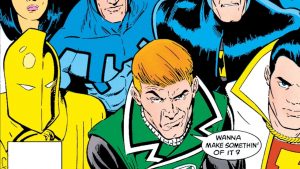
When the news headlines become so bleakly oppressive that you catch yourself fantasising about being plugged into one of those relaxing-looking gloopy human battery pods in The Matrix, it’s time for a break. The brain needs to check out every so often and treat itself to a little holiday. This can be achieved toddler-style with a nap, British-style with many wines, or Netflix-style with an episode binge.
If you take the TV route, you’ll want the kind of show that transports you off your Ikea sofa and turns you into a day-tripper into other lives. Let’s have no reminders of war or elections or the suffocating omnipresence of imminent environmental collapse. Instead, let’s roll ourselves up in the cushiony blanket of somewhere else. A fantasy.
That fantasy will, predictably, fit into one or more of these three categories:
Money Money Money
TV shows about the wealthy are a programming bedrock because not having to worry about money is a universal dream. In whatever context, era or genre, any show will be watched in which wealth burbles reassuringly away in the background like a water feature. Bridgerton, The Crown, Succession, The White Lotus, Yellowstone, The OC, Gossip Girl, anything starring a post-2020 Nicole Kidman… Fictional characters who throw balls and money away lower our collective blood pressure.
The schadenfreude of watching the rich being miserable and or/murdered on TV weirdly doesn’t erase the pull of fantasising about never needing to check your bank balance. TV audiences have a love/hate relationship with wealthy characters – we love their glamour, square footage and exoskeleton of staff and stuff propping up their invertebrate selves; and we hate them.
Unless we love them. There are rich people on TV, like Gilmore Girls’ moneyed matriarch Emily – a woman who’s never written a cheque under triple figures or met or a maid she hasn’t fired – who are easy to adore. As with Dame Maggie Smith’s Violet Crawley in Downton Abbey, the waspish bon mots of a practised snob are hard to beat.
Stupid rich people, mean rich people, unhappy rich people… they all make great viewing because wealth is the cosiest fantasy around. Yes, all of these characters grew up unloved, lonely and best friends with their nanny, but blackmail aside, nothing could land on their doormat to make their stomach clench like it’s at the gym – no bills, no credit card statements, no unexpected add-ons. They have houses to spare and cash on tap. What could be more escapist?
Where Everybody Knows Your Name
After wealth, community is the next biggest category in escapist TV (like “wealth”, this one also has an “olden days” subcategory, pulling in Poldark, Outlander, Anne With an E and all those other girls-in-straw-hat period dramas). In particular, we’re talking about the kind of small town community where everybody lives in walking distance of everybody else and friends see each other for coffee once a day instead of once every two months unless there’s a train strike and/or the babysitter gets glandular fever. Who lives like this? Nobody, which is why the fantasy has such a powerful draw.
The town of Stars Hollow in Gilmore Girls (a show that also, thanks to Lorelai Gilmore’s wealthy parents, can also be filed under the ‘rich’ category) is a typical example. It’s a lab-grown fantasy of a place where even town curmudgeon Luke is always in the thick of it thanks to his diner. Ghosts, Call the Midwife, Virgin River, even Star Trek and especially Friends are all built on the attraction of adults not living in separate houses in disparate towns, but in student-like proximity that lets them drop in on each other with the regularity at which the rest of us brush our teeth, but don’t see our pals.
Why is The Office such a perennial hit, especially among Generation Z? Because of the community on show – an oddly fantasy-escapist community in the gig economy and home-work age.
They Do Things Differently There
The final category is Exoticism, not as in pole dancers, but as in otherworldly places. Whether down to geography or time period, escapist shows feel like a different reality from the one you’re in.
Apple TV+’s epic sci-fi Foundation and Netflix’s sugary Emily in Paris both take place in made-up settings – the first, a faraway galaxy invented by Isaac Asimov, and the second, France’s capital city as filtered through a prism of Hallmark and E numbers. Parisians wouldn’t recognise either of them as reality, which is the attraction.
Doctor Who’s ‘spin the wheel’ approach to time periods and interplanetary travel provides its exotic escapism, and while a serious sci-fi like The Expanse deals with war, politics and everything we might come to TV to take a breather from, the space setting puts it all at a remove. The same goes for historical drama – by dint of being set decades or centuries before, it still has that elsewhere allure. The past, after all, is a different country.
There we have it: wealth, community and otherworldliness – the three categories of escapist fiction. So many successful shows and movies put ticks in all three columns. Harry Potter’s a rich wizard who lives with his friends in a castle. Frodo Baggins is a rich hobbit who goes camping with his mates. Rory Gilmore is a trust fund kid who lives with her mother/best friend around whom the town of Stars Hollow orbits. The Doctor can magic £20 notes out of cashpoints and shacks up with a new bestie every couple of years in the TARDIS… Money, nearby pals and a touch of the unknown. It’s the escapist recipe.
The post Every Escapist TV Show Fits Into One of These Three Categories appeared first on Den of Geek.








